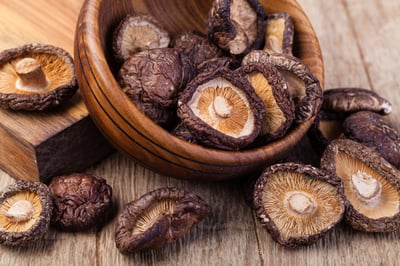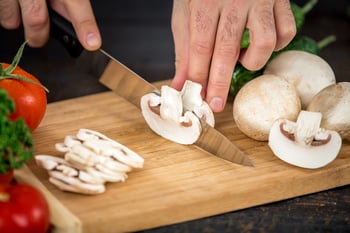We all want to improve our immune system, which is responsible for protecting our bodies from infection and disease.
But in order to maintain healthy immunity, we have to consistently consume a long list of vital vitamins and other nutrients. The good news is, many of these nutrients can be acquired through a robust, balanced diet. In order to reduce your need for dietary supplements, you just need the right awareness of which foods support your immune system the most.
Here are nine top nutrients to boost your immune system, many of which are found in mushrooms!
1. Vitamin D
This powerhouse vitamin helps to build and maintain strong bones by helping the body absorb calcium, according to The National Institutes of Health (NIH), Office of Dietary Supplements. Interestingly, it’s the only vitamin our body produces just by exposure to sunlight, though many of us consume it in dietary supplements or by eating food that naturally contains the vitamin. Production by our bodies of this special vitamin is triggered by natural sun rays, therefore it’s often called “the sunshine vitamin.”
A Few Foods with Vitamin D
- UV-light-exposed mushrooms
- Trout
- Salmon
- Fortified milk and juice
- Eggs
Daily Value (DV**): 20 mcg / 800 IU
Vitamin D & Mushrooms
Some fortified processed products like cereal and juices contain added vitamin D, but “High Vitamin D” mushrooms are the only readily available produce item naturally containing vitamin D — making these fungi an incredibly valuable addition to your diet.
Here’s a chart that compares our High Vitamin D mushrooms with typical retail mushrooms, which are not UV-exposed, based on their vitamin D levels per serving:
2. Vitamin C
We’re all told from a young age that it’s important to drink our orange juice for some vitamin C. That’s because this nutrient acts as an antioxidant to help protect cells from damage, absorb iron from plant-based foods and support proper immune function, according to The NIH.
A Few Foods with Vitamin C
- Citrus fruits like oranges and lemons
- Tomatoes
- Sweet peppers
- Broccoli
- Strawberries
DV: 90 mg
3. Vitamin A
Helps the heart, lungs, kidneys and other organs to work properly, according to The NIH. There are actually two different forms of vitamin A. The first is called preformed vitamin A and can be found in meat, poultry, fish and dairy products. Provitamin A, the other type, can be found in fruits, vegetables and other plant-based products— and this is often the form you’ll see in dietary supplements.
A Few Foods with Vitamin A
- Sweet potatoes
- Spinach
- Carrots
- Cheese
DV: 900 mcg
4. Vitamin B6
This vitamin plays an important role in immune function and is needed for more than 100 enzyme reactions involved in metabolism, according to The NIH. It’s also a vital nutrient during pregnancy and infancy for brain development as well as immune function.
A Few Foods with Vitamin B6
- Shiitake mushrooms
- Chicken
- Tuna
- Chickpeas
- Bananas
- Squash
DV: 1.7 mg
Vitamin B6 & Mushrooms**
The Shiitake is the only mushroom with a significant amount of vitamin B6. Per
100 g of raw Shiitake, you’ll find 0.293 mg (15% DV per 85g serving) of B6, per the U.S. Department of Agriculture. While other mushrooms contain trace amounts of vitamin B6— like White with 0.104 mg/100g (5% DV per 85g serving)— other varieties contain much less.
More on B Vitamins & Mushrooms**In addition to vitamin D, many mushrooms also contain five of the eight essential B vitamins such as riboflavin (B2), folate (B9), thiamine (B1), pantothenic acid (B5) and niacin (B3). White and brown mushrooms see significant levels of B2, B3 and B5, especially. You may be thinking, “that sounds great, but how do all these B vitamins help the body?” Not only do they help you form red blood cells, which carry oxygen and remove carbon dioxide, but these vitamins also allow your body to turn food into energy. A number of B vitamins are important for a healthy brain too. Each individual B vitamin has its own unique benefits as well, from B2, which helps to maintain healthy skin and sharp vision, to B9, which helps your metabolism function properly. Learn more about each vitamin’s individual functions. The body isn’t able to produce B vitamins on its own in quantities great enough to be beneficial, so the only way we get them is through our dietary choices or supplements. |
5. Vitamin B12
This particular B vitamin helps to keep the body’s nerve and blood cells healthy and to make DNA, the genetic material in all cells, according to The NIH. It’s also known for preventing a type of anemia called megaloblastic anemia, which can make sufferers feel tired and weak.
A Few Foods with Vitamin B12
- Salmon
- Tuna
- Beef
- Chicken
- Eggs
- Milk
DV: 2.4 mcg
6. Vitamin E
Vitamin E fights off invading bacteria and viruses while also helping widen blood vessels and preventing blood clots, according to The NIH. It acts as an antioxidant once inside the body, protecting your cells from the damaging effects of free radicals.
A Few Foods with Vitamin E
- Almonds
- Hazelnuts
- Sunflower seeds
- Peanut butter
DV: 15 mg
7. Selenium
This trace mineral is an antioxidant, meaning it helps to remove free radicals that are linked to cancer, heart problems, inflammation, premature aging and more. It’s also an immune system booster, fueling the antibodies that build your resistance to sickness.
A Few Foods with Selenium
- White, Baby Bella and Portabella mushrooms
- Brazil nuts
- Halibut
- Ham
- Beef
- Turkey
DV: 55 mcg
Selenium & Mushrooms**
With about 8 mcg of selenium in three ounces (85 g) of White mushrooms, this serving provides 15% of your daily value (DV). Brown mushrooms have even higher levels of selenium per serving, packing 40% DV in just three ounces.
8. Zinc
Zinc is found in cells all throughout our body. It helps the immune system fight off invading bacteria and viruses, according to The NIH, and can even help to heal wounds.
A Few Foods with Zinc
- Mushrooms
- Lobster
- Beef
- Pork
- Swiss cheese
DV: 11 mg
Zinc & Mushrooms**
Small traces of zinc can be found in mushrooms, such as Shiitake (1.03 mg per 100 g; 8% DV), Portabella (0.53 mg per 100 grams; 4% DV), and White (0.52 mg per 100 grams; 4% DV). But with the recommended dietary allowance being 11 mgs, it would be hard to get close to the value by consuming raw mushrooms alone. While these mushrooms do contain zinc, with Baby Bellas containing the most (1.1 mg per 100 grams; 8%), the amount is insignificant.
9. Iron
We use iron to make hemoglobin, a protein in red blood cells that carries oxygen throughout the body, according to The NIH. It also helps to produce myoglobin, a protein that provides oxygen to muscles. In this way, our body needs this important nutrient for growth and development.
A Few Foods with Iron
- Oysters
- Lentils
- Potatoes
- Fortified breakfast cereals
- Dark chocolate
DV: 18 mg
Small traces of iron can be found in mushrooms, however, Oysters are the only variety that contain more than 2% DV. With 1.33 mg/100g; 6% DV per 85g serving, it would be hard to reach your daily value by consuming raw mushrooms alone. The amount of iron is considered insignificant.
The Remarkable Benefits of Vitamin D
Now that you’ve learned about some of the best vitamins and minerals for supporting a strong immune system, it’s time to dig deeper.
Shockingly, nearly 42% of Americans lack adequate vitamin D. But why? Because this special vitamin is produced by exposure to natural sun rays, it’s often called “the sunshine vitamin.” Modern indoor lifestyles keep us out of the sun’s helpful rays; and even when we are outside, sunscreen, sunglasses and protective clothing can block our skin from adequate exposure.
A terrific way to obtain adequate vitamin D is through your diet! Learn more about the incredible benefits of High Vitamin D mushrooms by downloading our free ebook.
**All mushroom health and nutritional benefits data courtesy of The Mushroom Council. For information on Monterey Mushroom’s products, review our Fresh Mushroom Nutrition Facts.







